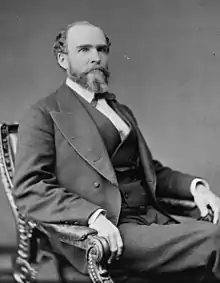Thomas M. Norwood
Thomas Manson Norwood (April 26, 1830 – June 19, 1913) was a United States senator and Representative from Georgia.
Thomas Manson Norwood | |
|---|---|
 | |
| Member of the U.S. House of Representatives from Georgia's 1st district | |
| In office March 4, 1885 – March 3, 1889 | |
| Preceded by | John C. Nicholls |
| Succeeded by | James W. Overstreet |
| United States Senator from Georgia | |
| In office November 14, 1871 – March 3, 1877 | |
| Preceded by | Homer V. M. Miller |
| Succeeded by | Benjamin H. Hill |
| Member of the Georgia House of Representatives | |
| In office 1851–1862 | |
| Personal details | |
| Born | April 26, 1830 Talbot County, Georgia |
| Died | June 19, 1913 (aged 83) Savannah, Georgia |
| Political party | Democratic |
Early years and education
Born in Talbot County, Georgia, he pursued an academic course, and graduated from Emory College in 1850. He studied law under Georgia governor James Milton Smith,[1] and was admitted to the bar in 1852, commencing practice in Savannah.
Political service
He was a member of the Georgia House of Representatives from 1861 to 1862 and was a presidential elector on the Democratic ticket in 1868. He was elected as a Democrat to the U.S. Senate and served from November 14, 1871, to March 3, 1877.[2] Norwood was the first Democrat from the South seated in the Senate after the Civil War.[3] He was a staunch critic of the Civil Rights Act of 1875.[4] He resumed the practice of law in Savannah, and was elected as a Representative to the Forty-ninth and Fiftieth U.S. Congresses, serving from March 4, 1885, to March 3, 1889.
Legal career
In 1889 he again resumed the practice of law, and was appointed judge of the city court of Savannah in 1896, serving twelve years.
In his last address before his retirement on December 31, 1907, Norwood called for the execution of Black men who had consensual sexual relationships with White women, accusing them of being violent and abusive. He also called for life imprisonment for White women who were involved, and subjecting Black people to chattel slavery.[5]
Death and legacy
He returned to his country home, Harrock Hall, near Savannah, and died there in June 1913. Interment was in Laurel Grove Cemetery, Savannah. His posthumously published book A True Vindication of the South argued that the South had been justified in its fight against the North.
References
- The National Cyclopaedia of American Biography, Volume XIII. New York: James T. White & Company. 1906. p. 474. Retrieved 23 July 2016.
- Congressional Serial Set. U.S. Government Printing Office. 1903. pp. 392–395.
- "Norwood, Thomas M. (Thomas Manson), 1830-1913". SNAC (Social Networks and Archival Context). Retrieved June 27, 2020.
- Bank, Steven A. (January 1, 1995). "Anti-Miscegenation Laws and the Dilemma of Symmetry: The Understanding of Equality in the Civil Rights Act of 1875". 2 (1). Retrieved 23 July 2016.
{{cite journal}}: Cite journal requires|journal=(help) - "Dec. 31, 1907 | U.S. Senator Advocates Death Penalty for Black People in Interracial Relationships".
- United States Congress. "Thomas M. Norwood (id: N000160)". Biographical Directory of the United States Congress.
Works
- A true vindication of the South, in a review of American political history Savannah, Ga., Braid and Hutton 1917.
- Norwood, Thomas M. Mother Goose carved by a commentator. Savannah: Morning News, 1900.
External links
- Works by or about Thomas M. Norwood at Internet Archive
- Stuart A. Rose Manuscript, Archives, and Rare Book Library, Emory University: Thomas M. Norwood papers, 1859-1874
- Centennial Exposition: Speech of Hon. Thomas M. Norwood of Georgia, in the Senate of the United States, February 10, 1876
- Thomas M. Norwood at Find a Grave
